| Srl | Item |
| 1 |
ID:
120133
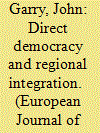

|
|
|
|
|
| Publication |
2013.
|
| Summary/Abstract |
Analyses of voting in European Union referendums typically distinguish between 'second-order' effects and the impact of substantive 'issues'. In order to explain change in referendum outcome, two types of substantive issues are distinguished in this article. Focusing on Irish voting in the Lisbon Treaty referendums and using data from post-referendum surveys, it is found that perceptions of treaty implications outperform underlying attitudes to EU integration in predicting vote choice at both referendums, and perceptions of treaty implications are strong predictors of vote change between the referendums. The findings have broadly positive implications for normative assessments of the usefulness of direct democracy as a tool for legitimising regional integration advance.
|
|
|
|
|
|
|
|
|
|
|
|
|
|
|
|
| 2 |
ID:
120134


|
|
|
|
|
| Publication |
2013.
|
| Summary/Abstract |
A number of institutional and non-institutional factors hamper electoral coordination and, hence, increase party system fragmentation in the nominal tier of mixed electoral systems. Contrary to expectations, the number of electoral parties is not lower in all old democracies. Nevertheless, the level of democratic experience modifies the effect of other variables like the type of mixed electoral system or the closeness of the races. Econometric tests evaluate this phenomenon in a diverse sample of 15 countries and a total of 57 elections with more than 10,000 observations at the district level.
|
|
|
|
|
|
|
|
|
|
|
|
|
|
|
|
| 3 |
ID:
120132
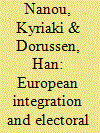

|
|
|
|
|
| Publication |
2013.
|
| Summary/Abstract |
The assignment of policy competencies to the European Union has reduced the divergence of party policy positions nationally, leaving the electorate with fewer policy options. Building upon insights from spatial proximity theories of party competition, the convergence argument predicts convergence particularly in policy domains with increasing EU competence. As the policy commitments that derive from EU membership increase, parties become more constrained in terms of the feasible policy alternative they can implement when in office. The analysis uses manifesto data at the country-party system level for nine policy domains. It uses ordinary least squares (OLS) estimation with country fixed effects, a lagged dependent variable and country corrected standard errors. Controlling for other factors that could plausibly explain policy convergence, the models also assess whether the convergent effect of party positions varies across different types of parties. The main finding is that in policy domains where the involvement of the EU has increased, the distance between parties' positions tends to decrease. The constraining impact of EU policy decisions differs between Member and non-Member States. This effect is more apparent for the policy agendas of larger, mainstream and pro-EU parties in the Member States.
|
|
|
|
|
|
|
|
|
|
|
|
|
|
|
|
| 4 |
ID:
120129
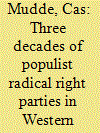

|
|
|
|
|
| Publication |
2013.
|
| Summary/Abstract |
The populist radical right constitutes the most successful party family in postwar Western Europe. Many accounts in both academia and the media warn of the growing influence of populist radical right parties (PRRPs), the so-called 'verrechtsing' (or right turn) of European politics, but few provide empirical evidence of it. This lecture provides a first comprehensive analysis of the alleged effects of the populist radical right on the people, parties, policies and polities of Western Europe. The conclusions are sobering. The effects are largely limited to the broader immigration issue, and even here PRRPs should be seen as catalysts rather than initiators, who are neither a necessary nor a sufficient condition for the introduction of stricter immigration policies. The lecture ends by providing various explanations for the limited impact of PRRPs, but it is also argued that populist parties are not destined for success in opposition and failure in government. In fact, there are at least three reasons why PRRPs might increase their impact in the near future: the tabloidisation of political discourse; the aftermath of the economic crisis; and the learning curve of PRRPs. Even in the unlikely event that PRRPs will become major players in West European politics, it is unlikely that this will lead to a fundamental transformation of the political system. PRRPs are not a normal pathology of European democracy, unrelated to its basic values, but a pathological normalcy, which strives for the radicalisation of mainstream values.
|
|
|
|
|
|
|
|
|
|
|
|
|
|
|
|
| 5 |
ID:
120131
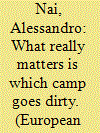

|
|
|
|
|
| Publication |
2013.
|
| Summary/Abstract |
Using individual data on Swiss federal ballots (VOX data) and an original dataset on the evolution and content of political campaigns, this article elucidates how negative campaigning influences individual turnout during Swiss federal ballots. It hypothesises that the effect of negativism on turnout depends on 'which camp goes dirty' and, specifically, on the direction of the political campaign ('status quo' versus 'policy change' campaigns). A series of multilevel models provide strong support for the hypotheses, by showing that high negativism in 'status quo campaigns' decreases individual turnout, whereas high negativism for 'policy change campaigns' increases it. It is argued here that this could depend on the emotional responses triggered by negativism in political campaigns.
|
|
|
|
|
|
|
|
|
|
|
|
|
|
|
|
| 6 |
ID:
120130
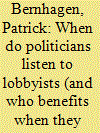

|
|
|
|
|
| Publication |
2013.
|
| Summary/Abstract |
This article provides an empirical test of an informational model of lobbying. The model predicts when lobbyists provide useful information to policy makers and when policy makers follow lobbyists' advice. The predictions are assessed against data on the policy positions and lobbying activities of firms and other organised groups in the context of 28 policy proposals advanced by United Kingdom governments between 2001 and 2007. The results suggest that the interactions between policy makers and lobbyists are driven mainly by the expected policy costs for policy makers, providing lobbyists with strong incentives to provide correct advice to policy makers. There is little support for the expectation that lobbyists can successfully persuade policy makers to take a course of action that is beneficial to the lobbyist at the expense of wider constituencies.
|
|
|
|
|
|
|
|
|
|
|
|
|
|
|
|